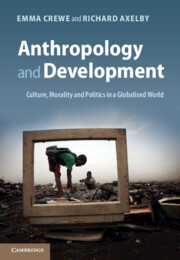Book contents
- Frontmatter
- Contents
- List of acronyms
- Preface and acknowledgements
- 1 Introduction
- 2 Anthropologists engaged
- 3 The social and political organisation of aid and development
- 4 The elusive poor
- 5 Human rights and cultural fantasies
- 6 Hierarchies of knowledge
- 7 The moralities of production and exchange
- 8 The politics of policy and practice
- 9 Imagining the future
- Appendix: challenging questions arising from this book
- Notes
- References
- Index
4 - The elusive poor
Published online by Cambridge University Press: 05 November 2012
- Frontmatter
- Contents
- List of acronyms
- Preface and acknowledgements
- 1 Introduction
- 2 Anthropologists engaged
- 3 The social and political organisation of aid and development
- 4 The elusive poor
- 5 Human rights and cultural fantasies
- 6 Hierarchies of knowledge
- 7 The moralities of production and exchange
- 8 The politics of policy and practice
- 9 Imagining the future
- Appendix: challenging questions arising from this book
- Notes
- References
- Index
Summary
The reduction of poverty has come to be understood as the key object of the development enterprise. It is one of the taken-for-granted, ‘silent traditions’ (Bourdieu 1977: 167) of development professionals that the goal of international aid and development is to free the poor from poverty. But who are the poor? What defines them? And who gets to decide?
Key points covered by this chapter
Predominant perspectives in development bureaucracies characterise poverty as absolute (rather than relative), such as living on less than $1.25 per day.
Populist accounts advocate that poor people should be listened to, their knowledge should be respected and their participation encouraged. However, these accounts can be naive when it comes to the subject of power hierarchies.
Both Marxist and feminist theories move beyond blaming the poor for their exploitation. The structural power relations explain poverty and need to be reversed.
Anthropologists have been influenced by all three of these traditions, but add their own dimension. They have a relational, historical perspective that sees poverty as embedded in culture, ideology and politics.
These various perspectives are underpinned by different ideas about the characteristics of poverty but also ‘the poor’. Such ideas about poor people fit within broader classifications of people, and the representation of their interests, that often deserve to be questioned.
Development professionals have invested hugely in describing the characteristics of poverty and determining how it can be measured. In this chapter we will explain these various attempts at identifying the elusive poor and how anthropologists have critiqued them. The idea of development depends on the existence of groups of people in need of assistance. In this sense ‘the poor’ are an imaginary group fashioned out of the needs and practices of those who hope to develop them.
- Type
- Chapter
- Information
- Anthropology and DevelopmentCulture, Morality and Politics in a Globalised World, pp. 88 - 106Publisher: Cambridge University PressPrint publication year: 2012



